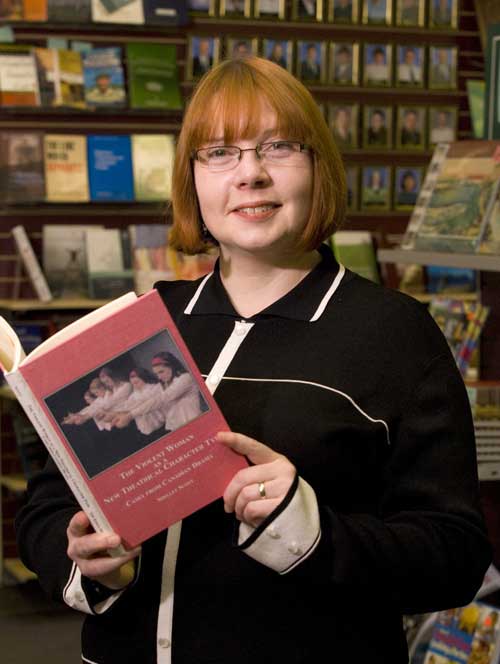Shelley Scott (BA '86) is an associate professor in the Department of Theatre and Dramatic Arts. She served as the department Chair from 2008-2011 and was the president of the Canadian Association for Theatre Research (CATR) from 2008-2012. Shelley teaches courses in theatre history, Canadian theatre, theatre theory and dramatic literature.
Scott has published two books: The Violent Woman as a New Theatrical Character Type: Cases from Canadian Drama (2007, The Edwin Mellen Press) and Nightwood Theatre: A Woman's Work is Always Done (2010, Athabasca University Press).
What first piqued your interest in your research discipline?
When I was an undergrad here at the U of L (1982-86), I acted in many of the department's productions and thought of myself as a theatre practitioner. I spent some time after university working for the Alberta Status of Women Action Committee (ASWAC), which, at that time, was the provincial feminist lobbying organization, and thought of myself as a feminist activist. But when I started graduate work at the Drama Centre in Toronto, I found the right combination: as a theatre scholar, I could study and write about plays by women and make my contribution to both feminism and Canadian theatre within the academy, the place I feel most at home.

I now occasionally direct plays for the department, which in turn feeds my thinking about theatre and sparks ideas for publications. For example, after directing Goodnight Desdemona (Good Morning Juliet), I delivered a conference paper about my analysis of that play; that paper was published in an academic journal, which was later included in an anthology of articles about Canadian productions of Shakespeare, and then finally formed a portion of one of the chapters in my book about Nightwood Theatre, where the play first premiered.
How is your research applicable in "the real world"?
In terms of the publication, a lot of the value is simply in
recording and preserving theatre activity, which is, by its very nature easily lost. A company such as Toronto's Nightwood Theatre, which has been around since 1979, serves as an incredible reflection, not only of all the plays that have been produced and of the artists that have worked on them, but also of the changes in feminist thought and the social realities that shape a women's theatre company.
What is the greatest honour you have received in your career?
Serving as the president of the Canadian Association for Theatre Research for four years has been a great honour. CATR is the national organization for theatre scholars and practitioners: it's a veritable "who's who" of Canadian theatre academics, and it's a great privilege to consider these people my friends and colleagues. Our annual conferences are packed with the very best scholarship, and I always leave inspired and energized about the state of our discipline.
How important are students to your research endeavours?
I love the opportunities I have to direct because they allow me to interact with students in a different way, outside of the classroom and in an arena where they are contributing their creativity and ideas to a collaborative effort in a really interactive environment. Because I teach the history and theory courses for the department, I get to know the students in an intellectual and academic way, which is very exciting and rewarding. But the chance to work on a play together helps me to see other sides of them (and they see other sides of me!) and that in turn informs both my teaching and my perspective on writing about theatre. I think that, in the Fine Arts in particular, the interrelationship between teaching and research is fundamental.
If you had unlimited funds, which areas of research would you invest?
On a personal level, I would love to travel and see more theatre and learn about women's theatre companies all around the world. I am going to a women playwright's conference in Stockholm this summer, and that's the kind of international event I'd like to be able to explore more often. In terms of creative activity, I would build a new Fine Arts building here on campus, one with all the fabulous theatre facilities and studio space we could imagine – plus accessible parking!
This story first appeared in the June 2012 issue of the Legend. For a look at the entire issue in flipbook format, follow this link.
